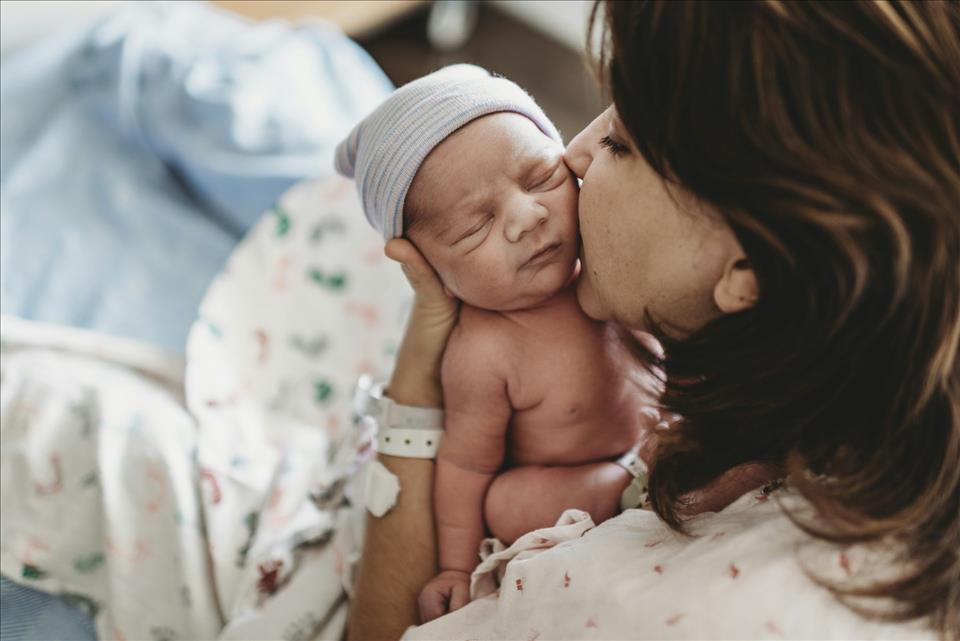
Babies Can Get Hepatitis B At Birth. Here's Why Trump Is Wrong About Delaying The Vaccine
The claims came amid a slew of other statements on autism , paracetamol and vaccines which medical experts have warned are not grounded in evidence .
So, what does the evidence say about hepatitis B? And why is it important to give babies the vaccine from birth?
What is hepatitis B?Hepatitis B is a liver infection caused by the hepatitis B virus. The infection can be chronic (long-term) and puts the infected person at high risk of liver cirrhosis, liver cancer and death.
Hepatitis B virus can be spread through contact with infected body fluids. This includes blood, saliva, vaginal fluids and semen. So yes, as Trump suggested , hepatitis B can be sexually transmitted. But that's not the only way to get infected.
Importantly, the virus can also pass from a mother to her baby via the birth canal during childbirth. If a newborn is exposed to hepatitis B at birth, there's a 90% chance they'll develop chronic infection. Over a lifetime, about one in four of those who have chronic infection will die from liver disease or liver cancer.
In countries where hepatitis B is widespread, the virus is most commonly passed from mother to child at birth, or from an infected child to an uninfected child during the first five years of life.
There is no cure, meaning a hepatitis B infection is for life. Fortunately, we have a highly effective vaccine that can prevent against infection.
Most effective hours after birthThe World Health Organization (WHO) recommends children receive the first dose of hepatitis B vaccine at birth . Since 2000, this has also been the standard recommendation for all infants in Australia – ideally within 24 hours of birth – as part of our National Immunisation Program .
If a pregnant woman tests positive for hepatitis B surface antigen (HBsAg) – meaning she has a chronic infection – her infant should ideally receive the first dose of hepatitis B vaccine within four hours of birth. This will be administered together with the hepatitis B immunoglobulin, a medicine that contains antibodies to hepatitis B.
Hepatitis B vaccine alone is estimated to be 75% effective at preventing infection during childbirth, while the vaccine and immunoglobulin together are 95% effective .
This birth dose of the vaccine, followed by three follow-up doses at two, four and six months, provides long-term protection for at least 20 years .
Protection lasts well into adolescence and adulthood, when behaviours such as sexual activity or injecting drug use can increase the risk of contracting the hepatitis B virus.
Hepatitis B vaccine is effectiveGlobally, 117 countries have introduced a dose of hepatitis B vaccine to newborns within the first 24 hours of life. This means millions of infants have safely received the vaccine at birth.
Vaccination of Australian newborns is high. For example, in 2023, 92% of babies in New South Wales received the hepatitis B birth dose. This rate has been relatively stable, between 92% and 95% , since 2007.
The impact of universal vaccination has been striking. Since Australia introduced free infant hepatitis B immunisation, newly acquired infections dropped by two thirds between 2000 and 2019.
Between 2014 and 2023, this program has supported a 60% decline in hepatitis B cases in people aged under 20.
Hepatitis B vaccination has been the cornerstone of controlling the disease for decades and has brought the US within reach of eliminating hepatitis B infections , which Australia is also aiming for by 2030 .
Hepatitis B vaccine is safeThe baby may experience minor side effects following vaccination, including pain, redness or swelling at the injection site. These usually last no more than a couple of days. Sometimes a small lump appears that may last a few weeks.
Delaying can be dangerousDelaying the first dose of hepatitis B vaccine is not recommended because:
-
The virus is silent and common. In Australia, about 0.9% of people live with chronic hepatitis B and almost one-third don't know they're infected. While transmission often happens during labour and delivery, babies can also pick it up later from household contact. Vaccination at birth and in infancy can protect against this type of transmission , known as horizontal transmission.
Screening isn't perfect. Hepatitis B screening is recommended for all pregnant women , to help prevent newborns developing chronic hepatitis B from infection at birth. A woman may be referred to an infectious disease specialist and/or recommended anti-viral medication during pregnancy . However, not all mothers are tested during pregnancy. Even if they are, infection can occur after testing or be missed entirely. So the birth dose acts as an important safety net.
Evidence shows vaccinating babies at birth is one of the safest, most effective and accessible ways to protect children against a lifetime of hepatitis B infection – and other complications that can lead to preventable deaths.

Legal Disclaimer:
MENAFN provides the
information “as is” without warranty of any kind. We do not accept
any responsibility or liability for the accuracy, content, images,
videos, licenses, completeness, legality, or reliability of the information
contained in this article. If you have any complaints or copyright
issues related to this article, kindly contact the provider above.


















Comments
No comment